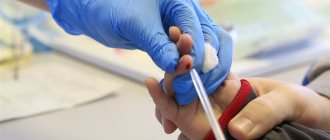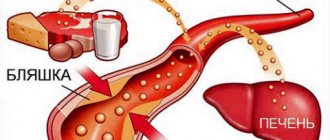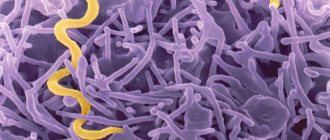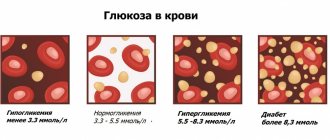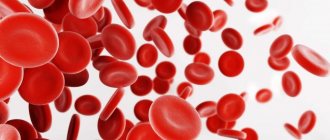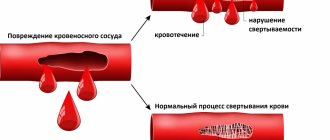What is RW blood test
A special category of medical tests includes blood tests for RW, or the Wassermann reaction. This technique detects markers of syphilis in the blood and determines how much time has passed since infection (after contact with a carrier of the infection). Today, donating blood for RW is the only way to diagnose the latent form of the disease. The reliability of the analysis influences the treatment program, the result of which determines the patient’s quality of life.
Syphilis is a chronic venereal disease caused by the pathogen Treponema pallidum. Characterized by the manifestation of ulcers on the skin and mucous membranes. With timely diagnosis, syphilis can be successfully treated with immunomodulatory drugs. The RW analysis determines the causative agent of syphilis and specific antibodies to it produced by the human immune system.
Detailed description of the study
Syphilis is an infectious disease caused by Treponema pallidum. Transmission of infection occurs primarily through sexual contact without the use of barrier contraception. However, it is possible to become infected with treponema pallidum through contact and household contact if personal hygiene rules are not observed, as well as transmission of the pathogen from mother to child during childbirth or breastfeeding. Syphilis can affect any organs and systems. In the absence of timely treatment, the disease becomes chronic. Initially, a hard chancre is formed at the site of contact with the source of infection - a painless ulcer with a small amount of transparent content on the surface. Often the body reacts to the introduction of the pathogen by inflammation of the lymph nodes located near the site of the lesion. Within a few weeks, a scar forms in place of the chancre. However, the disease does not recede, and after some time the infected person notices the appearance of a specific rash on the body - the appearance of small bright pink spots (rosacea rash). This stage is called secondary syphilis. The disease is prone to periodic exacerbations with changes in the nature of the rash. Tertiary syphilis is the result of untimely diagnosis and treatment of this disease. Along with the formation of nodes and tubercles on the skin, which are called gummas, prone to ulceration and scarring, damage to internal organs is observed. Diagnosis and treatment of syphilis is carried out by a dermatologist. To confirm the diagnosis, a modern test for determining rapid plasma reagins, or RPR test (Rapid Plasma Reagins), is used. These proteins are antibodies to the lipid components of cells destroyed by the pathogen.
Indications for analysis
Medical workers, employees of cosmetology and dermatology offices, and food workers are required to donate blood for RV. Other indications for a specific test are:
- pregnancy planning;
- preparation for operations;
- unprotected sex (especially with a new partner);
- suspicion of sexually transmitted infections;
- blood or sperm donation;
- the appearance of an incomprehensible rash on the mucous membranes and skin, discharge from the genitals, disruption of the menstrual cycle in women;
- visible enlargement of lymph nodes (especially in the groin area).
What categories of people and professions are subject to examination for RW
Identifying infected individuals helps prevent transmission and spread of infection. Therefore, groups of people and professions have been identified that must be examined for preventive purposes:
- workers of food enterprises, food factories, retail outlets;
- medical personnel of clinics and hospitals;
- drug addicts and dependent people;
- blood, sperm, tissue donors;
- contact with the detected patient;
- patients visiting a medical facility for the first time;
- patients before hospitalization and surgery;
- people with fever for more than a month and other unclear symptoms.
In addition to the mandatory contingents, there are other indications for examination:
- analysis is taken from pregnant women in consultation;
- with a symptom such as bone pain;
- after casual sexual contact;
- when identifying clinical signs such as genital ulcers, heavy discharge, skin rashes, enlarged lymph nodes.
How to take a blood test for RW
A blood test for RV is taken on an empty stomach - at least six hours must pass between meals and the laboratory test. Tests in an adult are taken from the ulnar vein, in an infant - from the cranial or jugular vein. The patient is seated on a chair or laid on a couch, a vein is pierced and 8-10 ml of blood is taken and sent for testing. After collecting the material, proper nutrition and plenty of fluids are recommended (it is better to prefer hot sweet tea). On this day it is better to avoid physical activity and alcohol.
Blood collection procedure
A person usually receives a referral to donate blood from a venereologist. At the request of the patient, the examination can be carried out anonymously. In this case, a referral from a doctor is not required.
To obtain the most reliable data, the patient must know how to donate blood. It is important to follow these recommendations:
- The collection of biological material is done in the morning. Before this, it is forbidden to eat, you are only allowed to drink water;
- a few days before the procedure, fatty, smoked, sour, spicy foods and alcoholic drinks should be excluded from the diet;
- blood is taken from a vein or finger;
- The patient usually receives results within 1–2 days in the laboratory or from the attending physician;
- A repeat test must be taken after 90 days.
If the result is positive, the patient is prescribed additional examination and the necessary treatment. Therapy tactics and medications are selected on an individual basis.
Decoding
The results form includes pluses or minuses. The latter speak of a negative reaction and absence of illness. A positive reaction can be described with one to four plus signs. The transcript shows the stage of the disease:
- ++++ or +++ – positive test;
- ++ – weakly positive;
- + – doubtful, requires re-checking.
If the RW analysis shows a negative result, this does not exclude that a person has syphilis at the first or third stage. Plus, a negative reaction may indicate the destruction of red blood cells. The secondary period of syphilis does not always show a positive result. In the first 17 days the reaction may be negative, and only by the sixth week it may show ++++, and even then only in 25% of patients with syphilis. After this, the reliability approaches 80%. Approximately 5% of healthy people show a false positive result.
- Heartburn every day - what to do. Causes and treatment of heartburn
- Diet of models
- How to freeze dill
RV test is positive
If the test for RV is positive, this indicates the presence of antibodies to Treponema pallidum in the blood - that is, about 1.5 months have passed since the infection. Other reasons for the appearance of ++++ on the results sheet are:
- carrying out antisyphilitic therapeutic measures - reducing the acute process;
- pregnancy in the absence of the disease itself - the analysis will be weakly positive in approximately 1.5% of women;
- primary syphilis – 80% of cases at 6-8 weeks;
- secondary syphilis in 100% of cases;
- clinical relapse of the disease;
- tertiary period of the disease - in 75% of cases;
- early congenital syphilis.
RW negative
If you receive a negative test result, you can talk about the absence of infection and antibodies to syphilis in the body, but this is not always the case. In the early stages of the disease, the results will be negative because antibodies simply do not have time to develop. Plus, certain diseases and individual characteristics of patients influence the reliability failure.
The most frequently asked questions about syphilis tests
02.08.2018
Quantity
The most frequently asked questions about syphilis tests
How to get tested for syphilis for free?
To do this, you need to go to the clinic at your place of residence and visit your local doctor, who will give you a referral for testing. Testing for syphilis is free for all residents of the Russian Federation under the compulsory medical insurance policy.
Where can I get tested for syphilis anonymously?
Tests can be done anonymously in any paid laboratory; skin and venous dispensaries often offer this service themselves. It is also possible to test for syphilis at home using rapid tests that are sold in pharmacies. However, it must be remembered that such a test does not give an accurate result, and if you suspect syphilis, you should consult a doctor.
How many days after sexual intercourse can you donate blood for syphilis?
If infection has occurred, the test for syphilis will be positive no earlier than ten to fourteen days later. This period may be longer, so if the results are negative, the test should be repeated after 2 weeks.
Where is blood taken for syphilis?
Blood for syphilis is most often taken from a vein, but can also be taken from a finger. It depends on the type of analysis.
Preparation. How to get tested for syphilis?
Before donating blood for syphilis, you should not eat for four hours—blood must be donated on an empty stomach. In addition, you should not drink alcohol 12 hours before the test. This is important because liver damage from alcohol can cause false positive tests.
How long does it take to test for syphilis on average?
The results are usually known the next day. Conducting rapid tests takes no more than 30 minutes.
What test is taken for syphilis and what is it called?
For screening, when there is no suspicion of the disease, either RMP (microprecipitation reaction) or RPR (rapid plasma-reagin test). Sometimes such screening tests are called the Wasserman reaction. If there are any real suspicions or doubts, they are never limited to one analysis. At the same time, one of any of the screening group (RMP or RPR) and one of any of the more specific testing group (RPGA or ELISA) are performed, then they act depending on the results and the patient’s history.
Can a syphilis test be wrong?
Maybe!
The probability of error in different methods depends primarily on the period of illness and the general condition of the body. Non-treponemal tests are most sensitive at the height of the disease - in the secondary period. Due to their low specificity, they often give false-positive results. This can happen due to fever, flu or other infectious disease, recent vaccination, chronic diseases and a number of other reasons. Treponemal tests are more sensitive in the later period. They can also give false-positive results, but only if there are pathogenic bacteria similar to Treponema pallidum in the body that cause other diseases: non-venereal treponematoses pinta (rare in Russia) or Lyme disease (transmitted through a tick bite).
False negative test results are possible with all diagnostic methods. They depend on the body's immune response: no response - no reaction to syphilis. This is possible in people infected with HIV, as well as those who are immunocompromised for other reasons. In addition, there is a reverse reaction: hyperproduction of antibodies, the “prozone” effect, in which there are so many antibodies that they prevent each other from reacting with the antigen. The result is a false negative result.
For a simpler understanding of the material, here is a table of deciphering the results of a clinical and laboratory examination of a patient:
• If the non-treponemal test (one of the RMP/RW/RPR) and the treponemal test (RPGA/ELISA) are positive, an additional alternative treponemal test is performed (ELISA if the first test was RPGA, and vice versa - RPGA if there was an ELISA). If the test becomes negative, the patient's blood is sent to an expert laboratory and additional tests are performed. If the second treponemal test becomes positive, a diagnosis of “latent syphilis” is made. This condition may persist for some time after treatment. If the patient has been treated before, then in order to confirm the diagnosis, an additional test for IgM is performed. If the results are positive, the diagnosis is confirmed, but the test is still recommended to be repeated after 2 weeks. If the results are negative, syphilis is refuted. • If the non-treponemal test (RTP/RW/RPR) is negative and the treponemal test (RPGA/ELISA) is positive, then the condition can be assessed as “late syphilis” or “no syphilis” if the patient has previously been fully treated. To distinguish between these two conditions, an additional IgM test is performed (IgM ELISA, RIF-abs-IgM, Immunoblotting-IgM). If IgM is present in the blood, they diagnose “late syphilis” and treat it. If not, the patient is considered healthy. • If RPR (or RW/RMP) is positive, RPGA is positive, and ELISA is negative (or vice versa: RPGA “-” and ELISA “+”), then the test results are questionable and it is recommended to send the blood to an expert laboratory or conduct alternative tests (RIF , Immunoblotting). • If the non-treponemal test (PMP/RW/RPR) is positive and the treponemal test (RPGA/ELISA) is negative, then an additional treponemal test (ELISA/RPGA) is performed. If it gives a positive result, the blood is sent to an expert laboratory. If negative, then the diagnosis is refuted, and the result of the non-treponemal test is considered false positive.
| RPR/ RW/ RMP | RPGA | Treatment was carried out | Diagnosis | Further tactics | |
| + | + | + | — | Hidden syphilis | ELISA/RIF for IgM |
| + | + | + | + | Condition after treatment | Observation by a doctor is recommended, repeat tests after 2 weeks |
| + | — | + | — | Questionable test result | It is recommended to send the blood to an expert laboratory |
| + | + | — | — | Questionable test result | It is recommended to send the blood to an expert laboratory |
| — | + | — | — | Questionable test result | It is recommended to send the blood to an expert laboratory |
| + | — | — | — | False positive result. The patient is healthy | No treatment required |
| — | + | + | + | Condition after treatment, the patient is healthy | Removal from the register |
False positive reaction
In 5% of patients, a false positive reaction is observed - a condition when the analysis shows ++, but the patient is not sick. The reasons for a false positive manifestation are:
- tuberculosis, systemic lupus erythematosus, leukemia, leprosy, leptospirosis, cancer, typhus, scarlet fever, HIV and AIDS;
- beriberi and sleeping sickness, hepatitis;
- in pregnant women or those who have just given birth;
- during menstruation;
- after anesthesia, consumption of alcohol, drugs, fatty foods, coffee, cigarettes, medications, administration of certain serums or vaccination;
- acute infections in pregnant women.
What to do if RW is positive
If the obtained data show ++++ or ++, a secondary blood sampling is necessary. Sometimes ORS (disease selection response) is used. To do this, blood serum is applied to a glass slide and a cardiolipid antigen is added. If the repeated result is positive, a visit to a venereologist is required to make an accurate diagnosis.
To prevent congenital syphilis in children, pregnant women donate blood for RW during all nine months: this test is one of the mandatory procedures for expectant mothers. If a pregnant woman becomes infected, comprehensive treatment is necessary during the first months. If treatment is neglected, the consequences are dangerous for both the mother and the unborn child.
Biological material for research
To detect the causative agent of syphilis in the body, which is caused by treponema pallidum, which has the shape of a spiral, the following types of biological material are used in laboratory research:
- venous and capillary blood;
- cerebrospinal fluid (secret taken from the spinal canal);
- samples from lymph nodes;
- scraping of ulcerations.
Blood is examined using several techniques
Where is blood taken for syphilis? To make a diagnosis, the patient must donate not only blood from a vein, but also from a finger. This helps to more accurately examine the biomaterial. What samples will be taken from the patient is determined by the doctor, which depends on the severity of the person’s condition, the diagnostic method and the equipment that the medical center has.
Price
You can donate blood for RW in private clinics or district hospitals. When undergoing a medical examination under the compulsory medical insurance policy, the patient has the right to a free analysis during the initial examination. In private clinics in Moscow prices will be:
| Service name | Price range, rubles |
| Fasting blood collection or repeated donation | 199-300 |
| Flocculation test | 370-500 |
| Test for the presence of antibodies to spirochete pallidum | 400-500 |
| PCR test | 500-800 |
Direct types of diagnostics
The most accurate method for diagnosing syphilis is to detect the causative agents of the disease under a microscope. This method can accurately detect antibodies in 8 out of 10 infected people. But even if no antigens were detected in the other two patients, this does not mean that they are not infected. Most likely, little time has passed since the pale spirochete entered the body and immune cells have not had time to develop.
A blood test can identify the causative agent of syphilis.
This study is prescribed to patients at both the primary and secondary stages of the disease, when rashes and ulcerations characteristic of syphilis appear on the human body and mucous membranes. By examining the fluid secreted from foci of infection, it is possible to accurately diagnose a sexually transmitted disease.
The study is carried out using a complex test, during which an immunofluorescence reaction or RIF reaction is used. To perform such a test, the patient's biological material is pre-treated with fluorescent antibodies. These compounds stick to pathogenic microorganisms and glow. When examining samples, the laboratory technician may see glowing pathogens.
This technique is indicated for the early detection of syphilis. With further development of the disease, the sensitivity of this study decreases significantly. The test will also be ineffective after treating rashes and ulcers with antibacterial drugs. In such cases, it may give a false negative result.
An accurate but very expensive method for determining the disease is the polymerase chain reaction for syphilis. This technique helps identify the disease at various stages. But its big disadvantage is its high cost, so not everyone can afford to donate blood to determine pathogens using this method.
Another type of diagnostics is RIT analysis. Its main drawback is that the result has to wait a long time until the rabbit under study shows signs of infection.
Important! Despite the fact that the test is highly accurate, it is used quite rarely in modern medical practice.
